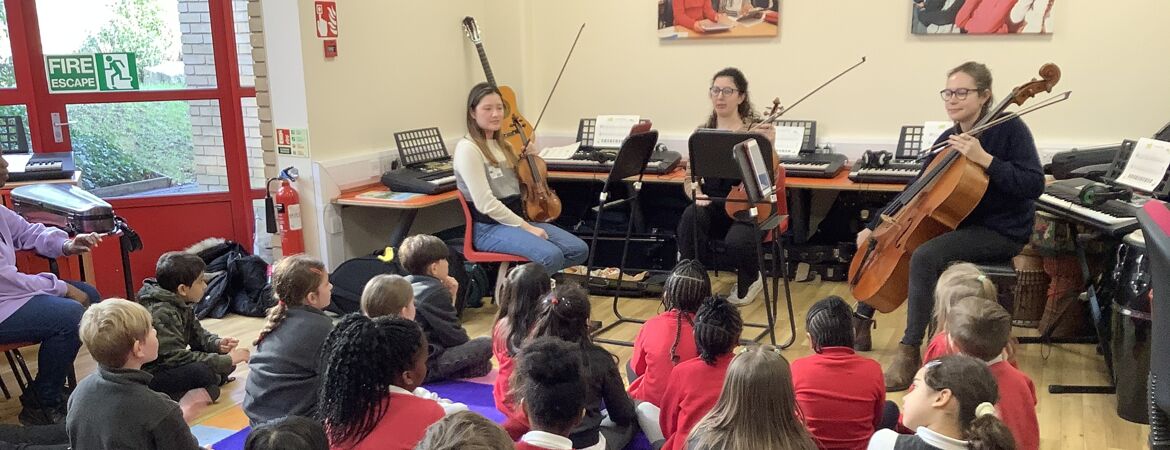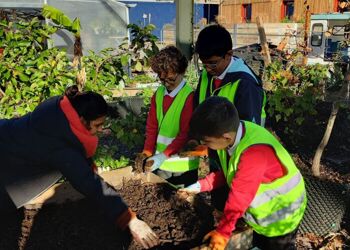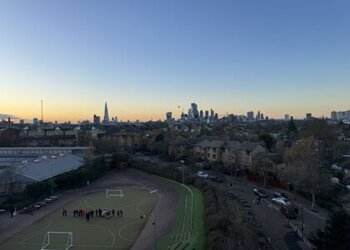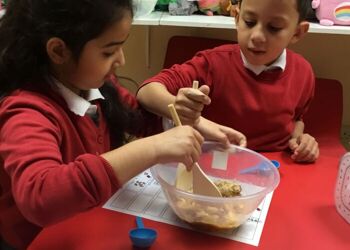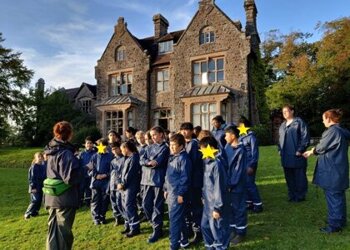
Our Curriculum
At Alfred Salter Primary School, we have developed a spiral curriculum where pupils will return to, and build upon, key knowledge each year. We strive for our pupils to leave school as knowledgeable, confident and creative thinkers.
Our curriculum is broad and we encourage our children to aim high and to benefit from as many opportunities and experiences as possible. We make the most of our London location and encourage pupils to explore a wide variety of topics around the broad themes of 'Who I am', 'Where I come from' and 'Who I want to be.'
Please click on the links below for a full overview of our curriculum.
'The breadth of the curriculum is impressive.' (Ofsted)
Early Years
In Nursery and Reception, we plan activities and experiences that help children to make progress in their development and learning. We value that young children will have had an extensive range of different experiences and will already have a wide range of skills and interests when they join Alfred Salter. We plan and resource our curriculum taking account of children’s interests and needs and providing opportunities for all children to thrive.
Throughout each day, the children have opportunities to explore and develop learning experiences which help them to make sense of the world through structured play. They practise and build up ideas and learn how to control their actions and understand the need for rules. They have the opportunity to think creatively alongside other children as well as on their own. They communicate with others as they investigate and solve problems.
The learning environment is planned for both indoors and outdoors to encourage a positive attitude to learning. The children decide which free-flow activities to engage in, as this encourages autonomous learning. We enjoy taking the children out on visits and inviting visitors into the school. We also enjoy exploring the school environment, including our school garden. Throughout the year, we increasingly take part in whole school activities, such as singing assemblies and whole school celebrations. Our ‘Culture bag’ is a key part of Reception. This is an opportunity for every child to share with the class their heritage.
At Alfred Salter, we believe that all parents and carers have an important role to play in the education of their child. We appreciate that parents are children’s first educators, and that when parents and practitioners work together, the results have a positive impact on the child’s overall development and learning. We recognise the importance of home/school links and enjoy developing positive relationships with the whole family.
The Early Years Foundation Stage is based on seven Key Areas and four Characteristics of Effective Learning. These are as follows:
Prime Areas:
- Personal, Social and Emotional Development
- Physical Development
- Communication and Language
Specific Areas:
- Literacy
- Mathematics
- Understanding the World
- Expressive Arts and Design
Playing and exploring – engagement
- Finding out and exploring
- Playing with what they know
- Being willing to ‘have a go’
Active learning – motivation
- Being involved and concentrating
- Keeping trying
- Enjoying achieving what they set out to do
Creating and thinking critically – thinking
- Having their own ideas
- Making links
- Choosing ways to do things.
Reading
Our primary aim at Alfred Salter is to develop pupils’ love of reading. We have a school library where children are able to choose from a range of quality fiction and non-fiction texts to read at home. We also follow the Oxford Reading Tree (and, in Reception and Year One, Dandelion phonics books) Reading scheme. These are graded reading books which enable pupils to gradually develop their reading skills with a range of appropriate fiction and non-fiction books. We have a home-school reading system for all year groups, where pupils (and, for younger pupils, parents) are encouraged to record their home reading on a daily basis – vital to your child’s continued success at school! Alongside this, we have book fairs, reading events and, of course, World Book Day celebrations!
Phonics
Phonics is taught through a highly structured, synthetic phonics programme called ‘Sounds-Write’. The programme teaches the skills (blending, segmenting and phoneme manipulation), concepts and knowledge needed for learning to read and write. Phonics is taught on a daily basis from Nursery up to Year Two. Sessions last between twenty and forty minutes, depending on the age of the children. Lessons consist of various tasks related to reading, spelling and handwriting. Children are taught to recognise, read and retrieve each sound.
At Alfred Salter, our Reception classes are taught the initial code, whilst Year One and Year Two are taught the extended code. Some of the main activities completed each week are: Sound Swap, Symbol Search, Word building, Dictation and Reading and Spelling. The programme is supported by both ‘Dandelion Readers’ and ‘Sounds-Write’ phonic books.
Phonics attainment is measured at the end of Year One, where pupils sit a low-pressure assessment to assess their ability to read a range of real and ‘alien’ words. Any pupils who do not reach the standard required to pass at this point receive additional catch up support in Year Two.
More information about phonics can be found on the Sounds-Write website:
https://www.sounds-write.co.uk/
You can also sign up for an online phonics course, which will help to improve your understanding of how to help your child to learn to read. You can sign up for the free course here:
https://www.udemy.com/course/help-your-child-to-read-and-write/
Writing
From Nursery to Year Six, we create writing opportunities through the study of high-quality fiction books, films and immersive experiences, such as school trips. Pupils will study a range of traditional tales; myths and legends; classic and contemporary stories and poems, as well as using history, geography, science and PSHCE topics to create many different types of non-fiction text types.
Over their eight years in school, pupils will write a range of fiction and non-fiction texts, revisiting text types in order to develop their fluency in different writing styles. We frequently use drama and role play to help pupils to articulate their thoughts and develop their ideas, and embed the teaching of spelling, vocabulary and grammar before allowing pupils to create their own, original responses.
Throughout pupils’ time at school, we also focus on the development of pupils’ handwriting and presentation, with an emphasis on the production of a high-quality final outcome.
Spelling
Spelling is taught systematically to ensure that all spelling rules relevant to each year group are covered over the academic year.
The teaching of spelling in Key Stage 1 is covered through the teaching of phonics.
Spelling is taught in Key Stage Two every week, following the National Curriculum word lists. Spellings are sent home as part of homework and children are tested each week.
Grammar and Punctuation
The teaching of grammar and punctuation is embedded throughout the teaching of reading, writing and speaking. There is also discrete teaching of grammar and punctuation which will vary between year groups.
Maths
At Alfred Salter, our vision is that through teaching for mastery, maths becomes accessible to all. All children have the opportunity to explore maths through using concrete objects, pictorial representations and abstract written calculations. Challenge is provided for all pupils through varied questioning and open ended tasks; with opportunities for children to reason, make connections and problem solve. All children are encouraged to discuss and share their mathematical thinking on their journey to become fluent mathematicians.
We use the White Rose scheme to structure our Maths Mastery learning. We spend a several weeks getting to grips with each key topics, providing the opportunity for children to investigate deeper and to thoroughly embed their learning.
Units of work:
Each area of learning is broken down into a series of carefully planned small steps to gradually develop children’s understanding:
- Mathematical talk and teacher questioning is used to help the children to unpick the structure of the maths and deepen their understanding. Children are encouraged to use full sentences as this supports children in thinking about and expressing the mathematics with greater accuracy.
- Varied Fluency - using concrete, pictorial and abstract methods of developing children’s skills.
- Reasoning and problem solving – to which children need to apply their understanding in 'real-life' scenarios.
Individual lessons:
Within this unit structure, each unit is then further broken down into smaller parts:
- Review of previous lesson whereby children are encouraged to make connections with prior learning.
- New learning – the teacher introduces and models new learning for the lesson and difficult points are identified
- Guided practise – children practise the new learning guided by the teacher
- Independent work – children practise on their own
- Developed learning/Variation – explore the new learning in different ways.
- Challenge extension – deepen thinking
- Plenary - review, misconceptions, reasoning and extension
Times Tables and Mental Arithmetic:
In addition to their daily maths lessons, pupils in Year Two and above focus on learning their times tables by heart. We use Times Tables Rockstars both at home and at school as a means of developing pupils' fluency in this vital set of maths skills.
Home Learning:
Each week, children from Years One to Six will receive a home learning task which will show you what the children have been learning in school and will give pupils an opportunity to reinforce their learning at home.
Science
Our Science Curriculum is based on the National Curriculum for Key Stages One and Two, where pupils focus on a number of themes which are regularly revisited throughout the children’s time at school.
The topics covered are:
Plants
Animals including humans
Everyday materials
Seasonal changes
Living things and their habitats
Rocks
Light
Sound
Electricity
Forces and magnets
Earth and Space
Properties and changes of materials
States of matter
As the children move up through the school, their knowledge is deepened and built upon; progressing - for example - from learning to name key bones in the human skeleton in Year One; exploring the digestive system in Year Four and understanding how the circulatory system works in Year Six.
Alongside developing pupils’ knowledge, understanding and vocabulary, we also develop pupils’ ability to work scientifically. Pupils learn to plan, carry out, record and evaluate a wide range of investigations which are always fun and memorable!
Art and Design
Our art curriculum aims to develop both pupils' knowledge and understanding of different artists and art forms and children's skills and creativity in making their own pieces of art. Each term, the whole school tackles one style of art, beginning with drawing and sculpture in the Autumn term, covering painting and printing in the Spring term and concluding with collage and textiles in the Summer term.
Sometimes, our art work links to pupils' learning in English, History or Geography (such as the WW2 propaganda posters made in Year 6 and the Roman Collages in Year 4). At other times, children's work relates to the study of famous artists and illustrators - including Oliver Jeffers in Year 1 and Olafur Elliason in Year 5.
Through gradually developing pupils' skills in our developmental study lessons, projects culminate in the production of high quality art work which we love to display throughout the school!
Computing
Our Computing lessons develop pupils’ digital literacy, equipping pupils with the skills to use basic computer programming and to use technology to research and investigate topics and to present their finished work.
Over the course of their time in school, lessons gradually develop pupils’ skills – beginning with simple floor robots and following instructions in Key Stage One up to creating computer programmes in Year Six using software such as Scratch.
We also embed use of technology in other lessons – using PowerPoint and Word to present final pieces of work and filming software to create simple movies.
We regularly teach e-safety to ensure that pupils feel confident and safe when using computers and the internet and that they know what to do if they come across something either inappropriate or uncomfortable.
Geography
Geographical learning at Alfred Salter is based on investigating and answering key ‘enquiry questions’ which help to focus children’s learning in such a way that they conclude each unit able to talk in depth about key aspects of the subjects studied.
In Key Stage One, pupils develop their understanding both of their capital city, the United Kingdom and the wider world. By studying our local area and comparing it with the contrasting environment of the Seaside, Year One pupils develop their vocabulary to describe human and physical features. The ‘Explorers’ topic lends itself to an exploration of the wider world, with a focus on reading and interpreting maps and globes. In Year Two, pupils visit and learn the significance of the most important landmarks in our capital city (their home!) and also venture abroad with a study of the Rainforests around the world.
In Lower Key Stage Two, we begin in Year Three with a depth study of the local area. Pupils have the opportunity to draw and read detailed maps of the local area. Our ‘United Kingdom’ topic enables pupils to develop their understanding of the key cities and physical features of our home islands. In Year Four, the focus is on rivers and the water cycle, with pupils tracing the journey of the River Thames.
As pupils progress to Year Five, children study the ever-changing topic of Climate Change, looking at the impact of Global Warming on the Polar ice caps. Our African Heroes topic includes a study of two contrasting areas of Africa. In Year Six, Geography learning is linked to our study of ‘Kensuke’s Kingdom’ as pupils trace Michael’s epic journey through a wide range of contrasting international locations.
Over the course of their time in school, pupils’ fieldwork skills are developed through opportunities for mapping, technical drawing and exploring their environment. We also build in opportunities for pupils to use digital resources, globes and atlases to explore different regions. Key vocabulary is carefully mapped, allowing children to gradually develop a rich geographical vocabulary.
History
At Alfred Salter, the History Curriculum develops pupils’ understanding of historical eras, significant events and the lives of key individuals. Children learn key vocabulary, dates and facts whilst also developing their skills as historians. Through the focus of an enquiry question (such as ‘What does the mystery of the empty Saxon grave tell us about Saxon Britain?), children interrogate sources; order events and collect evidence in order to formulate an informed response.
In Key Stage One, we focus on British history, looking at key events – such as the Battle of Hastings and The Great Fire of London – and significant figures – including Francis Drake; Mary Seacole and Emmeline Pankhurst. The pupils also compare and contrast life in the past with life in the present day and have the opportunity to study ‘living history’ by talking about changes within living memory.
In Key Stage Two, pupils encounter two strands of British and World history. Pupils learn about the changes which have occurred through the ages in the local area and about key periods in British history; such as the World Wars, the Viking invasions and the Stone Age. In addition, pupils learn about significant international civilisations, including the Ancient Greeks; the Ancient Egyptians and the Kingdom of Ancient Benin. As the pupils encounter the different time periods, links are made between the eras and pupils leave the school with a sound understanding of the chronology of the different ages studied.
We make extensive use of the extraordinarily rich museums and sites of historical significance in London and recent trips have included visits to the Tower of London; the Museum of London and the British Museum. We also visit local sites of interest, such as the Brunel Museum and have recently benefitted from in school workshops with the Museum of London Docklands.
Music
Each week, children from Reception to Year Six participate in whole school singing assemblies where they develop a range of performance skills. Over the course of the year, we learn a number of contemporary and traditional tunes, challenging pupils to sing both as an ensemble and in parts.
In class, pupils participate in lessons which gradually develop their skills in composition, performance and appreciation of music. In Early Years and Key Stage One, pupils sing and play simple musical instruments in class, often culminating in small performances.
All pupils are given the opportunity to learn to play the ukelele and either the violin, keyboard or cello. In Years Five and Six, pupils work with a specialist music teacher to further develop pupils' composition and music reading skills.
Extra-curricular
Many of our pupils also participate in small group or individual lessons in guitar, keyboard, cello and violin. A number of our pupils have successfully achieved ABRSM music medals to recognise their progress in violin playing.
Physical Education
“A high-quality physical education curriculum inspires all pupils to succeed and excel in competitive sport and other physically demanding activities. It should provide opportunities for pupils to become physically confident in a way which supports their health and fitness. Opportunities to compete in sport and other activities build character and help to embed values such as fairness and respect.”
National Curriculum, 2014.
At Alfred Salter we aim to promote high quality teaching of PE across the school. It is very important that all teachers and children are aware of the value and importance of the subject and how it can benefit children in a range of different ways. Developing pupils’ knowledge, skills and understanding in PE will help develop competence and confidence in a range of physical activities. It also provides children with opportunities to be creative and cooperative, preparing them for challenges they may face beyond school. Physical Education promotes positive attitudes towards a healthy and active lifestyle.
At Alfred Salter we aim to inspire children to participate and enjoy physical activity throughout their school lives and beyond. We have a holistic approach to PE that provides children with the fundamental building blocks for learning and life.
Through PE, pupils at Alfred Salter develop across 6 key multi-abilities:
-
Physical - To enable children to develop and explore fundamental physical skills with increasing confidence and control.
-
Social – To promote effective communication skills, teamwork and sportsmanship.
-
Personal – To encourage children to achieve personal bests and take pride in their individual journey in physical activity.
-
Health and Fitness - To promote positive attitudes towards a healthy and active lifestyle, including diet.
-
Cognitive – To challenge children through problem-solving and encourage evaluation and reflection in learning.
-
Creative - To develop children’s enjoyment of physical education through creativity and imagination.
In line with the National Curriculum 2014, we follow the ‘REAL PE’’ programme, supported by the LPESSN. The REAL PE programme aims to give all children the physical literacy, emotional and thinking skills to achieve in PE, Sport and life.
REAL PE provides engaging and inclusive schemes of work, which support our practitioners in the confident delivery of outstanding PE lessons. It is fully aligned to the new National Curriculum and Ofsted requirements and focuses on the development of agility, balance and coordination ‘ABCs’, healthy competition and cooperative learning through a unique and market leading approach to teaching and learning in PE. This scheme of work explores the philosophies of creating clear, shared learning journeys and providing quality personalised opportunities for children to accelerate their learning. The scheme is divided into 6 discrete multi-abilities (one taught per half term): Physical, Social, Personal, Health and Fitness, Cognitive and Creative.
Religious Education
At Alfred Salter, we follow the Southwark SACRE (Standing Advisory Councils for RE) RE Curriculum. All children have one RE lesson per week.
Children explore ‘Big Questions’ about religion over the course of each year. The questions help pupils to explore different religions and to make links between the different beliefs, as well as looking at it from a secular viewpoint. During their time in school, children will learn about Buddhism, Christianity, Hinduism, Islam, Judaism and Sikhism.
The ‘Big Questions’ are:
- Year 1 – What does it mean to belong?
- Year 2 – Can stories change people?
- Year 3 – How are symbols and sayings important in religion?
- Year 4 – What is special to me and the people in my community?
- Year 5 – How do beliefs influence actions?
- Year 6 – How important are similarities and differences between and within religions?
At Alfred Salter, we see the diversity of our pupils and their families as a great strength of our school. We recognise that, for many people, religion and belief play a crucial part in creating a person’s identity and moral standpoints. We believe that is important to learn about what other people believe, in order to help us to appreciate one another, and to develop a healthy respect for others’ lifestyles. At the same time, there is much to be learnt from the lessons taught within the different religions, and we value the opportunity to learn about and reflect upon these key messages.
In the long term, we intend the teaching of RE to help in the development of pupils’ understanding of the fundamental British Values which we teach throughout our pupils’ times at school, most specifically ‘Mutual Respect’ and ‘Tolerance of those of different faiths and beliefs’.
Spanish
Pupils in Key Stage Two learn Spanish as a second (or - for many of our pupils - third or fourth!) language.
We follow the 'Jolie Ronde' scheme of work which follows a cyclical curriculum, gradually building pupils' language skills over the four years. The children enjoy playing games, singing songs and completing written exercises to apply their knowledge.
In Years Three and Four, we cover basic vocabulary and expressions, including colours, food, greetings and places. In Years Five and Six, we progress to expressing opinions, extending responses and understanding basic elements of Spanish grammar.
Our aim is to develop pupils' love of language learning and to help them to see the links and difference between Spanish and English.
Throughout the year, we also celebrate Spanish culture and other languages, particularly with our 'European Day of Languages' celebration and our annual 'Spanish day'. We are always looking for more ways to celebrate our pupils' cultures and backgrounds - let us know if you have any ideas!
Play
OPAL - Outdoor Play and Learning
Children spend up to 20% of their time in school at play. Changes in society such as heavier traffic, busier lifestyles and fewer areas available for play have led to 'play deprivation' for many of today's children.
We wanted to make sure that our pupils' playtime was coherent and planned for. We therefore introduced 'Outdoor Play and Learning' (OPAL). You can read more about OPAL here:
http://outdoorplayandlearning.org.uk/
Now, our playtimes are fun and exciting, with lots for the children to do! We have lots of games and equipment which encourages children to role play, climb, explore and investigate. We also offer organised games each day to help our pupils to burn off their energy.
Better quality play leads to happier children and happier staff. With better quality play opportunities, there are fewer behaviour problems, a more positive attitude to school and improved skills development and learning. As the children improve their quality of play and have more enriching play times, there are fewer accidents and classroom learning is enhanced, as the children come in from play happy and ready to learn.
In February, 2019, Ofsted commented on our high-quality playtimes:
"Pupils are confident and self-assured. This is because adults teach them to be independent, to solve their own problems and to take risks. These skills are apparent within lessons and in the playground. The outdoor space offers high-quality provision and a range of activities: examples include a ball park, an arts space, a wildlife area and a running track. A sports coach provides structured games. Pupils also self-direct their play and use resources imaginatively."
Trips, Visitors and Residentials
We aim to develop pupils’ opportunities beyond the classroom with a comprehensive offer of trips, visitors and residential ‘School Journeys’ which aim to help the pupils make the most of our London location!
Beginning with local area visits in the Early Years and culminating in the Year Six opportunity to spend a week living as a farmer at the Farms for City Children farms in either Devon or Wales, we offer a range of trips and experiences which help to broaden our pupils’ understanding of the world.
Trips
Recent trips have included a Year One visit to The Tower of London; a boat ride on the River Thames in Year Two and a Year Five trip to the Houses of Parliament. The majority of our trips link directly to pupils’ learning in English, Humanities and Science and often feed into the work which pupils later complete in class. Such experiential learning enhances pupils’ understanding of a topic and allows them to place new ideas and vocabulary in context. We also have strong links with local arts organisations including the National Theatre and the Unicorn Theatre. We aim to offer the opportunity for every pupil in Years One to Six to attend at least one live concert, play or performance every year.
Visitors and Partnerships
Each term, we welcome a diverse range of visitors into the school to give talks, host workshops and run series of lessons around a theme. Many of our visitors cover aspects of personal, social and emotional education – such as visits from the Police, Fire service and the local hospital – equipping our pupils with life skills which will be of use both in and outside of school. We also welcome visitors from the local community, such as Canada Water library, and have recently welcomed Neil Coyle – our local MP – who spoke all about the recent election and his role as an MP.
We also have a number of longer term partnerships which have led to lasting outcomes for our pupils. We have recently worked with the Museum of London and Time and Talents Nursing home to create a community cookbook and our partnership with Shakespeare’s Globe has embedded a dramatic approach to learning across the curriculum.
Residentials
We offer three residential opportunities for our pupils – in Years Two, Four and Six.
In Year Two, the pupils stay overnight at Rippledown House, where they engage in pond dipping, teamwork activities and shelter building activities.
In Year Four, we venture further afield to Kingswood on the Isle of Wight. There, pupils can participate in high adventure activities such as High Ropes challenges and the zip wire whilst also enjoying the seaside location!
Finally, in Year Six, we take the pupils to one of the Farms for City Children – either Nethercott House in Devon or Treginnis in Wales. The pupils live and work as a large family for a whole week, caring for the animals on the farm and learning a great deal about living together in the countryside. It really is an unforgettable week!

